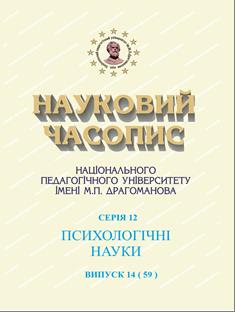THE FIRST YEAR STUDENTS’ MOTIVATION FEATURES IN EMERGENT REMOTE EDUCATION SETTINGS
DOI:
https://doi.org/10.31392/NPU-nc.series12.2021.14(59).09Keywords:
intrinsic motivation, extrinsic motivation, personal growth motivation, motivation for self-respect, subjectivity, first-year students, emergency remote educationAbstract
The article deals with the problem of the first-year university students’ motivation to study under conditions of emergent remote education during the COVID-19 pandemic, for whom a forced and sudden transition to distance learning coincided with the period of their adaptation to higher education. Advantages and limitations of the distance form of learning are analyzed in the context to motivate students to achieve educational goals. Specific features of students’ motivation under conditions of emergent remote education are disclosed. In order to research into features of the first-year students’ motivation to learn under those conditions, the Academic Motivation Scales “Academic motivation scales” questionnaire by T.O. Gordeeva was used. The technique permits to define development levels of various motivational constructs in the context of the self-determination theory. It has been identified that in academic years of 2020-2021, for the majority of students there dominated intrinsic motivation, whereas the general motivation dynamics tendency was a minor decline of indicators of all the scales for both intrinsic and extrinsic types of motivation. The only exception to the rule has become the amotivation scale indicators, demonstrating a slight growth. Comparison of the results obtained with the data regarding the first-year students involved in face-to-face learning shows that motivation of the students who studied in online and mixed type environments appears to be veraciously higher by all scales of intrinsic motivation as well as by the scales of self-respect and introjected motivation. The features disclosed, in our understanding, define the specific features of the first-year students’ adaptation processes within the emergency remote education. Besides, the results testify to the fact that, in spite of a negative lockdown influence, the students tend to be mobilized enough to face the challenges posed by the need to adapt to the learning conditions. Therefore, online settings coupled with the pandemic challenges, have created the stimulus to expedite the self-regulation processes of the first-year students. At the same time, thоse conditions are obviously not enough for the processes to gain mass and depth.
References
- Gordeeva, T.O., Sychev, O.A., & Osin, E.N. (2014). Oprosnik “Shkalyi akademicheskoy motivatsii” [“Academic motivation scales” questionnaire]. Psihologicheskiy zhurnal – Psychological journal, 35(4), 96–107 [in Russian].
- Dvoretskaia, T.A., & Akhmadieva, L.R. (2018). Dinamika napravlennosti uchebnoy motivatsii u studentov raznyih kursov v techenie uchebnogo goda [Оrientation dynamic of students’ educational motivation of different courses during the academic year]. Professionalnoe obrazovanie v sovremennom mire – Professional education in the modern world, 8(2), 1924–1933. https://doi.org/10.15372/PEMW20180222 [in Russian].
- Ivaneko, Yu. (2020). Dystantsiine navchannia yak zasib rozvytku samoorhanizatsii studentiv [Distance learning as a means of developing students’ self-organization]. Zbirnyk naukovykh prats “Problemy suchasnoi psykholohii” – Collection of scientific works “Problems of modern psychology”, 49, 60–83. https://org/10.32626/2227-6246.2020-49 [in Ukrainian].
- Krasiuk, Yu.M. (2010). Problemy motyvatsii navchalnoi diialnosti studentiv dystantsiinoi formy navchannia [Problems of students’ learning motivation in distance education]. Retrieved from https://ir.kneu.edu.ua/bitstream/handle/2010/25885/ZE_Krasiuk.pdf?sequence=1&isAllowed=y [in Ukrainian].
- Panferov, V.N., Bezgodova, S.A., Vasileva, S.V., Ivanov, A.S., & Miklyaeva, A.V. (2020). Effektivnost obucheniya i akademicheskaya motivatsiya studentov v usloviyah onlayn-vzaimodeystviya s prepodavatelem (na primere videolektsii) [Efficiency of learning and academic motivation of students in conditions of online interaction with the teacher (on the example of video-lecture)]. Sotsialnaya psihologiya i obschestvo – Social Psychology and Society, 11(1), 127–143. https://doi.org/10.17759/sps.2020110108 [in Russian].
- Prybylova, V. (2017). Problemy ta perevahy dystantsiinoho navchannia u vyshchykh navchalnykh zakladakh Ukrainy [Problems and advantages of revote education in higher educational institutions of Ukraine]. Problemy suchasnoi osvity – Problems of modern education, 4, 27–36. Retrieved from https://periodicals.karazin.ua/issuesedu/article/
view/8791 [in Ukrainian]. - Pulyaeva, V.N. & Nevryuev, A.N. (2019). Akademicheskaya motivatsiya: kak faktor udovletvorennosti obrazovatelnyimi uslugami [Academic motivation as a factor of satisfaction with educational]. Kreativnaya ekonomika – Creative Economy, 3, 533–544. Retrieved from https://periodicals.karazin.ua/issuesedu/article/view/8791 [in Russian].
- Savin, E.Yu. (2019). Sootnoshenie subyektnogo opyita studenta s vneshney i vnutrenney motivatsiey akademicheskoy aktivnosti [Correlation of student’s subject experience with extrinsic and intrinsic motivation of academic activity]. Mir nauki. Pedagogika i psihologiya – The world of science. Pedagogy and Psychology, 2. Retrieved from https://mir-nauki.com/PDF/70PSMN219.pdf [in Russian].
- Smulson, Yu.L. (2012). Dystantsiine navchannia: psykholohichni zasady [Remote education: psychological issues]. Kirovohrad : Imeks-LTD [in Ukrainian].
- Biwer,, Wiradhany, W., oude Egbrink, M., Hospers, H., Wasenitz, S., Jansen, W., & de Bruin,A. (2021). Changes and Adaptations: How University Students Self-Regulate Their Online Learning During the COVID-19 Pandemic. Front. Psychol., 12, 642593. https://doi.org/10.3389/fpsyg.2021.642593
- Deci, E., & Ryan, R.M. (2012). Motivation, Personality, and Development within Embedded Social Contexts: An Overview of Self-Determination Theory. In The Oxford Handbook of Human Motivation, 1–26. http://dx.doi.org/10.1093/oxfordhb/9780195399820.013.0006
- Markova, Т., Glazkova, І., & Zaborova, Е. (2017). Quality Issues of Online Distance Learning. Procedia – Social and Behavioral Sciences, 237, 685–691. https://doi.org/10.1016/j.sbspro.2017.02.043
- Meeter, M., Bele, T., Hartogh, C. d., Bakker, T., de Vries, R.E., & Plak, S. (2020). College students’ motivation and study results after COVID-19 stay-at-home orders. https://doi.org/10.31234/osf.io/kn6v9
- Meşe, E., & Sevilen, Ç. (2021). Factors influencing EFL students’ motivation in online learning: A qualitative case study. Journal of Educational Technology & Online Learning, 4(1), 11–22. Retrieved from https://dergipark.org.tr/en/pub/jetol/issue/60134/817680
- Stark, E. (2019). Examining the Role of Motivation and Learning Strategies in the Success of Online vs. Face-to-Face Students. Online Learning, 23(3), 234–251. http://dx.doi.org/10.24059/olj.v23i3.1556

